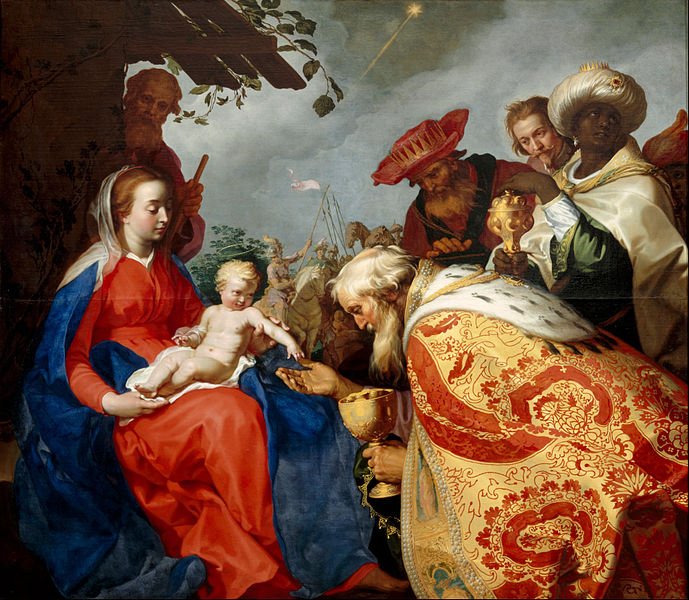[Greek] μάγος (magos), [Latin] magis: wise man, priest, sorcerer, interpreter, magician, seer, seducer; Act. 13:6,8, Mt.2:1,7,16

The Adoration of the Magi: painting by Abraham Bloemaart (1624)
Background Information:
Ancient Greek World: The magi were often associated with the Persian priestly caste and Babylonian astrologers. The Greeks, for the most part, held an antagonistic view toward magi, due to past Greek-Persian wars and conflicts. Magi were considered having an expertise in astronomy, astrology, magic, religious matters, alchemy, and fortune telling. The magis’ religious ideas were thought to be strongly influenced by philosophy. The Hellenistic culture harbored little good will toward the magi.
Strabo’s Geography 15.3.15: “There is a great body of Magi, called Pyraethi. The Persians have also certain large shrines. In the middle of these is an altar on which is a great quantity of ashes.”
Philo’s Spec. Laws III 100: “Now the true magical art, being a science of discernment, is studied not not merely by private individuals, but even by kings, and the very greatest of kings, and especially by the Persian monarchs, that they say that among that people no one can possibly succeed to the kingdom if he has not previously been initiated into the mysteries of the magi.”
Old Testament: Generally, it is obviously forbidden for Jews to have anything to do with someone who dabbles in sorcery, astrology, magic, and seeing. The Persians and their magi appear in the bible in the days of Daniel and Esther. The foreign kings and Pharaohs employed priests (wise men) for counsel and advice. Interestingly, King Solomon’s knowledge was equated with a sage. Daniel was appointed as chief of the magi.
New Testament: This term essentially refers to magi in a both positive and negative sense. The magi are wise man (astrologers) who sincerely seek and give homage to the infant Jesus. The other examples refer to Jewish sorcerers who engage in exorcism, magic, and witchcraft. These Jewish magi present a conflict between two religions, in which Christianity emerges victorious. Therefore, Christians are called not to condemn the magi, but to prove them wrong.
Scripture:
“When Herod realized that he had been deceived by the magi, he became furious. He ordered the massacre of all the boys in Bethlehem and its vicinity two years old and under, in accordance with the time ascertained from the magi.” Mt. 2:16
The scripture passage presents the magi in a positive light. One could speculate that the magi had already made a conclusion about King Herod’s evil nature.
“When they had traveled through the whole island as far as Paphos, they met a magician named Bar-Jesus who was a Jewish false prophet.” Act. 13:6
Bar-Jesus posed as a prophet. Luke takes the opportunity to distinguish Christianity from the magical acts of the time.
“But Elymas the magician (for that is what his name means) opposed them in an attempt to turn the proconsul away from the faith.” Act. 13:8
Paul immediately saw that Elymas was inspired by the devil. Elymas was later made blind.
Conclusion:
Magic, magical, magician
It is probably not surprising that the Greeks held antagonistic views toward the Persian magi (astrologers). There may have been some commonality in the study of the sciences and philosophy between the eastern (Persian and Babylonian) magi and the Greek philosophers and scientists.
It is interesting to note that there is no explicit mention of kings in the infancy narratives in Matthew’s gospel. Yet, magi have been likened with kings. Matthew’s gospel was written for the Jews. Therefore, Matthew’s gospels presents magi (kings) as authority figures, whom the Jews were already familiar with. On the other hand, Luke’s gospel, written for the downtrodden, presents shepherds who visit the infant Jesus. Interestingly, the eastern magi are presented in a positive sense, also foretelling the Gentiles’ acceptance of Christianity.
Jan. 6 is the Epiphany, commemorating the visit of the Magi. I hope you have your moment of epiphany.
